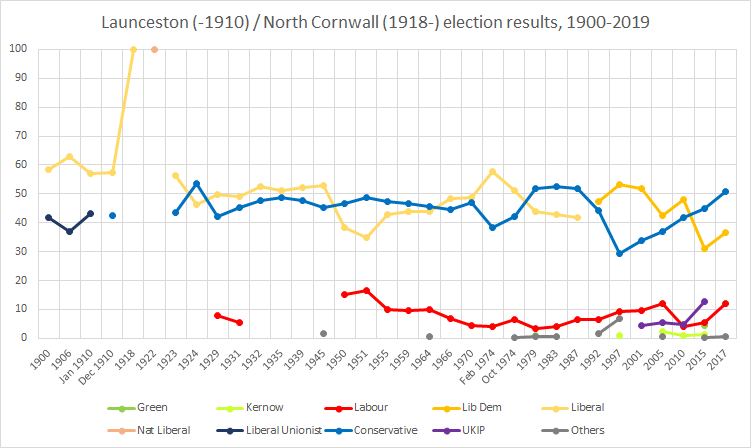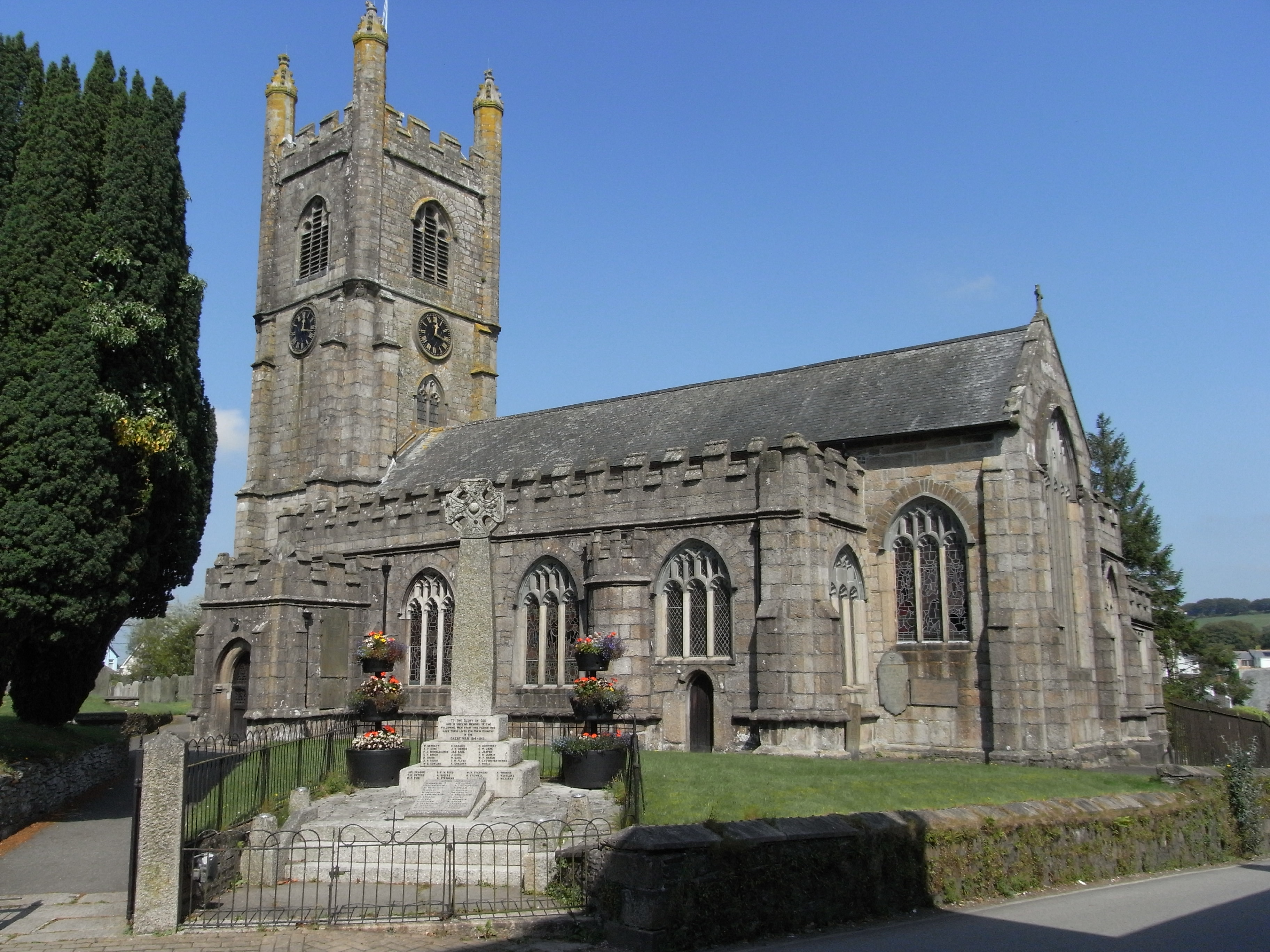|
Dunheved (UK Parliament Constituency)
Launceston, also known at some periods as Dunheved, was a parliamentary constituency in Cornwall which returned two Members of Parliament to the British House of Commons from 1295 until 1832, and one member from 1832 until 1918. It was a parliamentary borough until 1885, and a county constituency thereafter. Boundaries 1832–1885: The old Borough of Launceston and the Parish of St Stephen, and all such parts of the several Parishes of Lawhitton, St Thomas the Apostle, and South Petherwin as are without the old Borough of Launceston. 1885–1918: The Sessional Division of East Middle, East North, Lesnewth, and Stratton, and part of the Sessional Division of Trigg. History Launceston was one of 21 parliamentary boroughs in Cornwall between the 16th and 19th centuries; unlike many of these, which had been little more than villages even when established and were rotten boroughs from the start, Launceston, Cornwall, Launceston had been a town of reasonable size and importance thou ... [...More Info...] [...Related Items...] OR: [Wikipedia] [Google] [Baidu] |
East Cornwall (UK Parliament Constituency)
East Cornwall was a county constituency in the House of Commons of the Parliament of the United Kingdom. It elected two Members of Parliament (MPs) by the bloc vote system of election. Boundaries In 1832 the county of Cornwall, in south west England, was split for parliamentary purposes into two county divisions. These were the East division (with a place of election at Bodmin) and West Cornwall (where voting took place at Truro). Each division returned two members to Parliament. The parliamentary boroughs included in the East division, from 1832 to 1885 (whose non-resident 40 shilling freeholders voted in the county constituency), were Bodmin, Launceston and Liskeard. 1832–1885: The Hundreds of East, West, Lesnewth, Stratton, and Trigg, and in the hundred of Powder, the eastern division, i.e. the parishes of St Austell, St Blazey, St Dennis, St Ewe, Fowey, Gorran, Ladock, Lanlivery, Lostwithiel, Luxulyan, Mevagissey, St Mewan, St Michael Caerhays, Roche, St Samp ... [...More Info...] [...Related Items...] OR: [Wikipedia] [Google] [Baidu] |
Callington, Cornwall
Callington ( kw, Kelliwik) is a civil parish and town in east Cornwall, England, United Kingdom about north of Saltash and south of Launceston. Callington parish had a population of 4,783 in 2001, according to the 2001 census. This had increased to 5,786 in the 2011 census. Geography The town is situated in east Cornwall between Dartmoor to the east and Bodmin Moor to the west. A former agricultural market town, it lies at the intersection of the south–north A388 Saltash to Launceston road and the east–west A390 Tavistock to Liskeard road. Kit Hill is a mile north-east of the town and rises to with views of Dartmoor, Bodmin Moor and the River Tamar. The hamlets of Bowling Green, Kelly Bray, Frogwell and Downgate are in the parish. Railway station Callington railway station was the terminus of a branch line from Bere Alston, the junction with the Southern Railway's Tavistock to Plymouth line. The railway line beyond Gunnislake to the Callington terminus was c ... [...More Info...] [...Related Items...] OR: [Wikipedia] [Google] [Baidu] |
Roger Menwenick
Roger is a given name, usually masculine, and a surname. The given name is derived from the Old French personal names ' and '. These names are of Germanic origin, derived from the elements ', ''χrōþi'' ("fame", "renown", "honour") and ', ' ("spear", "lance") (Hrōþigēraz). The name was introduced into England by the Normans. In Normandy, the Frankish name had been reinforced by the Old Norse cognate '. The name introduced into England replaced the Old English cognate '. ''Roger'' became a very common given name during the Middle Ages. A variant form of the given name ''Roger'' that is closer to the name's origin is ''Rodger''. Slang and other uses Roger is also a short version of the term "Jolly Roger", which refers to a black flag with a white skull and crossbones, formerly used by sea pirates since as early as 1723. From up to , Roger was slang for the word "penis". In ''Under Milk Wood'', Dylan Thomas writes "jolly, rodgered" suggesting both the sexual double entend ... [...More Info...] [...Related Items...] OR: [Wikipedia] [Google] [Baidu] |
Richard Tolle
Richard is a male given name. It originates, via Old French, from Old Frankish and is a compound of the words descending from Proto-Germanic ''*rīk-'' 'ruler, leader, king' and ''*hardu-'' 'strong, brave, hardy', and it therefore means 'strong in rule'. Nicknames include "Richie", "Dick", "Dickon", " Dickie", "Rich", "Rick", "Rico", "Ricky", and more. Richard is a common English, German and French male name. It's also used in many more languages, particularly Germanic, such as Norwegian, Danish, Swedish, Icelandic, and Dutch, as well as other languages including Irish, Scottish, Welsh and Finnish. Richard is cognate with variants of the name in other European languages, such as the Swedish "Rickard", the Catalan "Ricard" and the Italian "Riccardo", among others (see comprehensive variant list below). People named Richard Multiple people with the same name * Richard Andersen (other) * Richard Anderson (other) * Richard Cartwright (other) * Ri ... [...More Info...] [...Related Items...] OR: [Wikipedia] [Google] [Baidu] |
Richard Lovyn
Richard is a male given name. It originates, via Old French, from Old Frankish and is a compound of the words descending from Proto-Germanic ''*rīk-'' 'ruler, leader, king' and ''*hardu-'' 'strong, brave, hardy', and it therefore means 'strong in rule'. Nicknames include "Richie", "Dick", "Dickon", " Dickie", "Rich", "Rick", "Rico", "Ricky", and more. Richard is a common English, German and French male name. It's also used in many more languages, particularly Germanic, such as Norwegian, Danish, Swedish, Icelandic, and Dutch, as well as other languages including Irish, Scottish, Welsh and Finnish. Richard is cognate with variants of the name in other European languages, such as the Swedish "Rickard", the Catalan "Ricard" and the Italian "Riccardo", among others (see comprehensive variant list below). People named Richard Multiple people with the same name * Richard Andersen (other) * Richard Anderson (other) * Richard Cartwright (other) * Ri ... [...More Info...] [...Related Items...] OR: [Wikipedia] [Google] [Baidu] |

